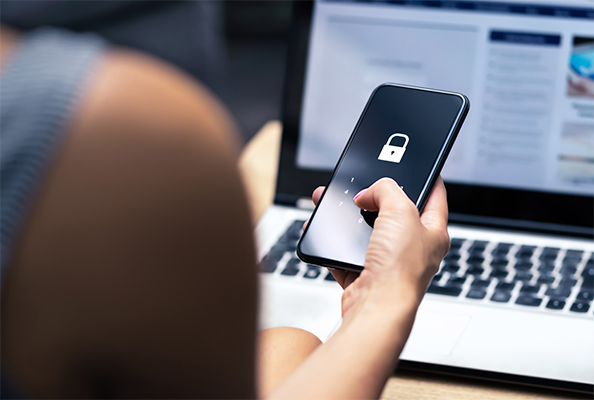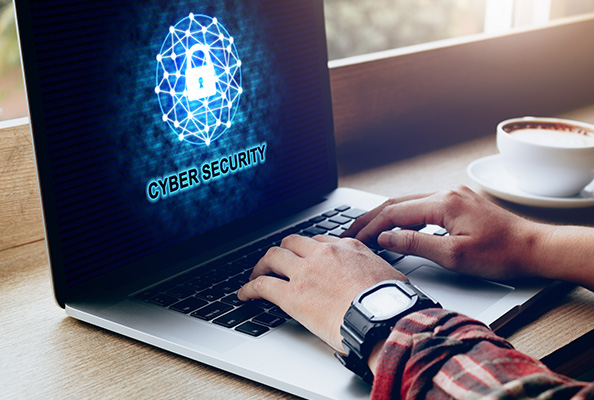Bank of Deerfield is committed to keeping your information safe. As such, we have a number of controls and protections in place. We will never request personal or accounting information to be sent via email prior to speaking with our customers. In the event you receive an email request from Bank of Deerfield for information, please contact the bank via phone to ensure the validity of the request. To further educate and understand how to keep yourself cyber safe, we are providing the following resources below.

What is Identity Theft?
When someone else is using your name, address, credit card, social security number, and/or medical insurance card to commit fraud.
What to watch out for?
- Unknown purchases on your credit card
- Receiving new credit cards in the mail with your name on it
- Opening of a new phone, electricity, and/or gas account in your name
- Theft of tax refunds
- Use of your health insurance to get medical care
What Steps can be taken to Protect against Identity Theft?
- Shred documents before loss or stolen, keep in a secure location
- Don’t carry your Social Security card in your wallet
- Ask questions before giving numbers out:
- Why do you need it?
- How will you protect it?
- Just give last 4 digits?
- Install security and firewalls on home computers
- Create long and complex passwords
- Add security features on mobile phones
- Sign-up for identity theft services from your bank, credit card provider, employers benefit programs, and insurance companies:
- Credit monitoring
- Identity monitoring
- Identity recovery services
- Identity theft insurance
What can I do to detect Identity Theft?
- Review your bills and billing cycles
- Check bank account and credit card statements, compare receipts
- Review free credit reports
What do I do if someone else is misusing my personal information?
- Notify https://www.identitytheft.gov/
- Freeze your credit files with credit bureaus:

CyberSecurity
Believe it or not, the Internet touches nearly every aspect of our daily lives. We communicate with friends and family, transact business, and handle our banking while relying on online internet based systems. However, this way of life brings increased risk of fraud, theft and many other nefarious activities. No industry, community, or individual is exempt from cyber risks. As a country, we face constant cyber threats. As individuals, cybersecurity risks can threaten our finances, identity, and privacy.
At Bank of Deerfield, we value the safety of our customers' identity and want to help you protect it. Feel free to select any of the links below to learn more about protecting yourself from identity theft.
By clicking on these links, you will be leaving Bank of Deerfield’s web site. This service has been provided for your education and convenience only. It does not imply that Bank of Deerfield requires you to take action.
CyberSecurity Resources
Department of Homeland Security: https://www.dhs.gov/topics/cybersecurity
Ready.gov cybersecurity site: https://www.ready.gov/cybersecurity
NIST Small Business Cybersecurity Corner: NIST Small Business Cybersecurity Corner provides actionable resources for small businesses on cybersecurity guidance, solutions, and training.www.nist.gov/itl/smallbusinesscyber
Federal Trade Commission (FTC) Materials: FTC provides a library of free publications you can order for consumers and businesses. Materials include information on privacy, identity theft and small business scams.www.bulkorder.ftc.gov
BeCyberSmart: Educate yourself to stay ahead of the game. Take responsibility for your cyber safety. You can learn about cybersecurity basics, scams, and how to report incidents.www.dhs.gov/be-cyber-smart
FBI Cyber Safety for Junior Americans: Let's not forget about youngsters. FBI-SOS is free, its fun, and its informative. It promotes cyber awareness by educating students in third through eighth grade on the essentials of online safety.www.fbi.gov/fbi-kids
The Better Business Bureau (BBB) provides information and resources on the various types of scams, as well as the warning signs to watch out for https://www.bbb.org/all/scamtips
Checking Your Credit
Order a copy of your credit report from one of the three credit reporting agencies every year to make sure all the information is correct, especially your name, address, and Social Security number. Look for indications of fraud, such as unauthorized applications, unfamiliar credit accounts, credit inquiries and defaults and delinquencies that you did not cause. Call any of the three national credit reporting agencies:
- Trans Union(800) 888-4213
- Experian(888) 397-3742
- Equifax(800) 685-1111
